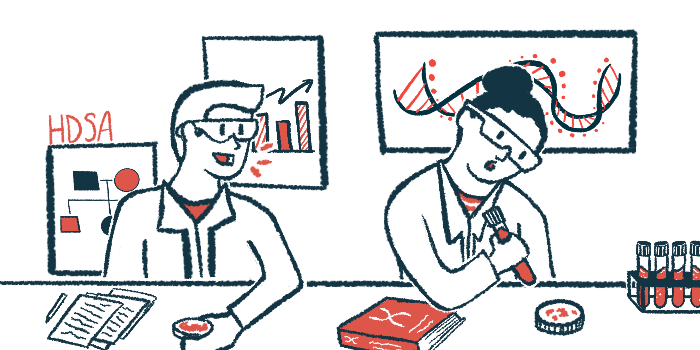HDSA 2024: Doctor shares tips for sleeping well with Huntington’s
Favors setting helpful routines and promoting comfort to taking pills
Written by |

For people with Huntington’s disease who are struggling to get a good night’s sleep, establishing good sleep hygiene — setting habits such as a regular bedtime routine and maintaining a cozy, dark sleeping space — may help.
Other potential ways to improve sleep include treating those Huntington’s symptoms that might influence sleep, being aware of the potential sedating effects of certain medications for such symptoms, and avoiding stimulants in the evening and screens in the bed.
These were among the tips for optimizing sleep in Huntington’s patients shared at this year’s Huntington’s Disease Society of America convention by Victor Sung, MD, a neurologist and director of the HDSA Center of Excellence at the University of Alabama at Birmingham.
Sleep is essential for human health, providing respite for the body to recuperate while the brain consolidates information. Missing out on sleep can lead to mood issues like irritability and difficulties with cognition or memory, in addition to the physical toll that being chronically tired takes on the body.
Getting a good night’s sleep can be challenging for people with Huntington’s
Underscoring the importance of sleep, Sung, who also serves on the HDSA’s board of trustees, pointed to a study done in the 1970s that purposefully deprived participants of sleep, and in which some started dying of sleep deprivation.
“That’s the bottom line. If we don’t sleep, eventually you can die from that because the body needs sleep,” Sung said, adding that such a study today “would be totally illegal.”
Getting a good night’s sleep can be a challenge for people with Huntington’s. About 4 out of every 5 patients experience sleep disturbances, such as taking a long time to fall asleep or waking up frequently during the night.
Patients also frequently experience disturbances in circadian rhythms, the body’s “internal clock” that normally helps ensure a person consistently feels tired or hungry at certain times of the day.
“Evidence shows that HD [Huntington’s disease] patients have progressive loss of this clock function over time. So as the disease progresses, their ability to manage these automatic clock things actually get worse,” Sung said.
Data suggests that, to some degree, sleep problems in Huntington’s are a direct result of the disease’s impact on brain biology. But certain Huntington’s symptoms, such as depression and chorea (uncontrolled movements), also can interfere with sleep and must be treated to improve sleep, Sun said.
Good sleep habits range from consistent bedtimes to relaxation techniques
However, antidepressants and anti-chorea medications can affect sleep. Patients should ask their physicians about potential side effects, and how to try to reduce them or to use the medications’ sedating effects to their advantage.
“All 24-hour pills have slightly higher levels in the first 12 hours than in the second 12 hours,” Sun said, so patients can take the once-daily medication “in the evening instead of in the morning, and use that sedation to help” fall asleep earlier.
An important part of a good night’s sleep is to practice good sleep hygiene, which Sung said “really just means good sleep habits.”
Routine and scheduling are critical tools for developing good sleep hygiene, Sung said. This can include everything from going to bed at a consistent time each night to avoiding stimulants like nicotine and caffeine in the evening. Incorporating routines to avoid long naps during the daytime and to relax right before bed, such as meditation or breathing exercises, also may help.
Sung stressed that this can be a lot to manage in practice, so small, incremental steps are key. For example, if a Huntington’s patient usually goes to bed around 1 a.m., expecting them to suddenly begin sleeping at 8:30 p.m. isn’t realistic. However, it might be possible to establish a bedtime of around midnight, and gradually move that time earlier over the course of weeks and months, Sung noted.
Similarly, he said it probably isn’t possible to quit nicotine or caffeine cold turkey, but limiting their use after 5 p.m. could be.
“You have to understand the general principles, but know that we aren’t necessarily going to get there overnight,” Sung said.
Avoid at night devices with bright screens and media triggering emotions
Patients and caregivers also should try to limit the use of brightly lit screens in bed, Sung suggested. He also advised avoiding any media that can trigger strong emotions, from horror movies to cable news, in the hours before bedtime.
“Cable news … it’s very sensationalized. They’re trying to get people riled up. And if you get riled up, you’re not going to go to bed at night, right?” Sung said, adding that “scary movies do the same thing.”
Another key aspect for a good night’s sleep is maintaining a comfortable sleep environment. This includes ensuring the bedroom is dark at night and bright during the day, and kept at a cool — but not too cold — temperature.
Notably, as Huntington’s patients may have trouble regulating their body temperature, it can be tricky to get the sleeping temperate just right. Sung suggested trying steps like using cooling or lightweight sheets, while also wearing socks to keep the toes warm.
Some medications may help improve sleep for Huntington’s patients, but Sung noted that he usually advises patients and caregivers to focus on good sleep hygiene as the first step.
“Even though I’m a physician, when it comes to sleep, I feel really strongly that pills should be kind of our last resort,” Sung said.
Note: The Huntington’s Disease News Today team is providing virtual coverage of the Annual Huntington’s Disease Society of America Convention (HDSA) May 30-June 1. Go here to see the latest stories from the conference.






